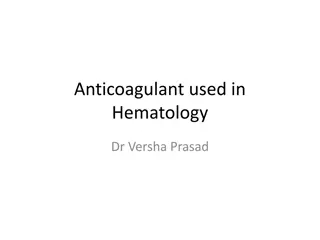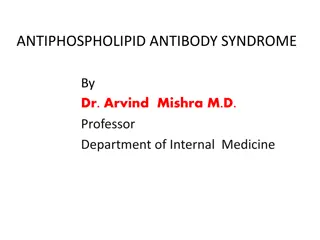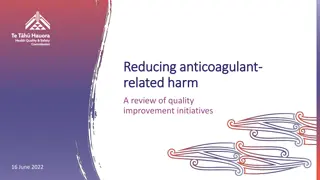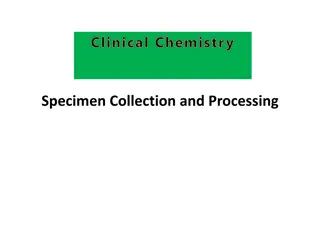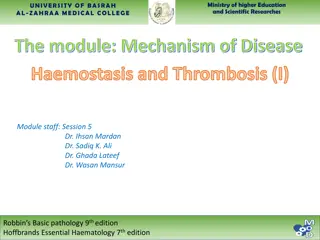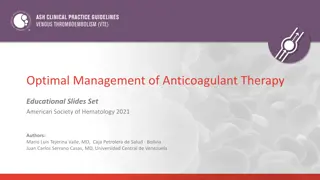(Anticoagulant)
This training introduces the concepts of anticoagulant therapy focusing on Warfarin Sodium. Understand the importance of anticoagulants, PT/INR testing, and identifying good and bad blood clots. Explore the role of anticoagulants in preventing stroke and managing blood clot-related conditions. Learn about PT/INR blood tests and their significance in monitoring Warfarin therapy, including where and how they can be obtained. Discover the implications of managing Warfarin therapy in a home setting and the requirements for conducting PT/INR tests.
Download Presentation

Please find below an Image/Link to download the presentation.
The content on the website is provided AS IS for your information and personal use only. It may not be sold, licensed, or shared on other websites without obtaining consent from the author.If you encounter any issues during the download, it is possible that the publisher has removed the file from their server.
You are allowed to download the files provided on this website for personal or commercial use, subject to the condition that they are used lawfully. All files are the property of their respective owners.
The content on the website is provided AS IS for your information and personal use only. It may not be sold, licensed, or shared on other websites without obtaining consent from the author.
E N D
Presentation Transcript
Warfarin Sodium (Anticoagulant) Therapy Training 03/10/2015
Objectives 1. What is an anticoagulant ? 2. Why is anticoagulant therapy necessary? 3. What is a PT/INR? 4. Who can give Warfarin sodium?
Circulatory System Heart Pumps blood through the body Delivers oxygenated blood Returns deoxygenated blood to lungs
Good Blood Clots Prevents or stops bleeding Normal body function Cut Flossing teeth Nosebleed Accident
Bad Blood Clots Stops the normal flow of blood within the body May cause Heart attack Stroke Deep Vein Thrombosis (DVT)- blood clot in legs Pulmonary Embolism- blood clot in lungs
Anticoagulant Blood thinner Brand Coumadin Generic Warfarin sodium
PT/INR Blood Test PT Prothrombin Time Used to measure how long it takes blood to clot INR International Normalized Ratio A way of standardizing PT results no matter the testing method used
PT/INR Blood Test 2 PT Prothrombin Time INR International Normalized Ratio INR Target INR Range
PT/INR Blood Test 3 May be obtained at Labs Clinics HCP visit Home self-test kit Lab home visit
PT/INR Blood Test 4 If managed in a home setting Must be performed by licensed staff Certified staff are NOT permitted to perform the test
Warfarin Sodium Can be affected by Illness Infections Diarrhea Indwelling catheters Fever High B/P
Warfarin Sodium 2 Can be affected by Other medications Certain foods Herbal preparations
Medication Interactions Increase effects of Warfarin sodium Ibuprofen, Aleve, Aspirin Decrease effects of Warfarin sodium Certain antibiotics, B/P meds
Food Interactions Decrease effects of Warfarin sodium Vitamin K Leafy green vegetables broccoli, kale, spinach Avocados Grapefruits and grapefruit juice
Vitamin K Important that the amount of Vitamin K eaten remains consistent
Vitamin K 2 Often used in the treatment of Warfarin sodium overdose
Herbal Interactions Garlic Ginger St John s wort Echinacea Ginkgo biloba Red clover Chamomile
Warfarin Sodium 3 May also be affected by Alcohol Nicotine
Warfarin Sodium 4 Supplied in different Strengths Shapes Colors
Warfarin Sodium 5 Administered at the same time each day helps To maintain a consistent blood level With accuracy of PT/INR results
Two Person Check The MAP Certified staff assigned to med administration Prepares the warfarin sodium Completing 3 cross checks of the 5 rights
Dose Verification The second MAP Certified staff Compares the To ensure the tablet in the med cup is the dose ordered
Warfarin Sodium 6 Med sheets must include Next PT/INR date Start/Stop dates 2 person check Special precautions
HCP Orders If received from an Anticoagulation Management Service (Coumadin Clinic) Must be signed by a HCP Telephone orders must be signed by the HCP within 72 hrs.
Prescription If the dosage is not stabilized (frequent dose changes) HCP may provide pharmacy with prescription which does not include a dosage, but will only include tablet strength as directed by current HCP
Pharmacy Label Individual s name Medication name (Warfarin sodium) Strength (e.g. ,2mg) Route (by mouth)
Tracking Follow agency policy Blister pack monitoring Add to count Flow Record or Event Sheet
Policy Warfarin sodium agency policy to include Training of MAP Certified staff Emergency procedures
Protocol Individualized Warfarin sodium protocol to include Details of how HCP orders are obtained Process for obtaining PT/INR lab draw PT/INR lab results Target INR Range
Adverse Effects Increased risk for bleeding Report to the HCP Unusual easy bruising Prolonged bleeding from cuts gums Frequent nosebleeds
Adverse Effects 2 Increased risk for bleeding Report to the HCP Black tarry stools Persistent weakness/tiredness Nausea/vomiting, stomach pain
Safety Decrease risk of bleeding by Using an electric razor for shaving a soft-bristle toothbrush waxed dental floss Being cautious with knives or scissors Preventing falls Not missing lab appointments
Training Must be Certified and/or Licensed to administer Warfarin sodium Certified staff must receive Warfarin sodium Therapy training
Remember Safety and Prevention Keep all HCP and lab appointments Give Warfarin sodium at same time each day Report changes when observed Monitor diet
Remember 2 You are key to safe anticoagulation therapy !


